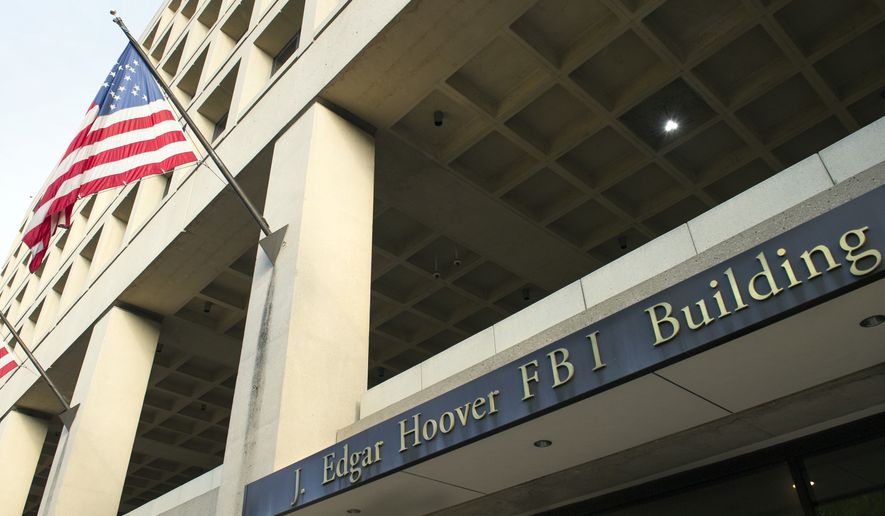Keeping the FBI’s headquarters in downtown Washington will actually cost the government more than moving it to a suburban location, an inspector general concluded in a report Monday that also dings the Trump administration for appearing to mislead Congress.
President Trump was personally involved in the decision to scrap the plans to move, and talked with General Services Administration chief Emily W. Murphy. But Ms. Murphy obscured those communications and other contacts with the White House in congressional testimony earlier this year, the GSA inspector general said.
“We found that Murphy’s answers to the questions about White House involvement were incomplete and may have left the misleading impression that she had no discussions with the president or senior White House officials in the decision-making process about the project,” the investigators concluded.
The FBI’s headquarters has been a touchy issue in Washington for years.
The bureau’s building on Pennsylvania Avenue has been deemed too small and outdated, and also a security risk for the FBI’s post-Sept. 11 mission. But finding a replacement has also been tricky.
Congress and the Obama administration had been determined to find space in the suburbs around Washington. But the Trump administration canceled those plans earlier this year, instead calling for the J. Edgar Hoover Building to be demolished and rebuilt on the same site.
Democrats were convinced Mr. Trump intervened in order to benefit his own property, the Trump International Hotel, just down the street on Pennsylvania Avenue. The White House had insisted it was about saving money.
The GSA said a rebuild would cost about $3.39 billion, or less than the estimated $3.57 billion relocation.
But the inspector general said GSA ignored some construction and relocation costs that, once included, boosted the price for a rebuild on Pennsylvania Avenue to $3.84 billion — 8 percent more than the relocation option.
And even under the administration’s own calculations, the rebuild site would have had fewer employees than the suburban location. So by a per-person cost, the rebuild came to nearly 20 percent more.
The inspector general said it’s too early to say whether the rebuild in downtown Washington would be able to meet the FBI’s security needs.
The report sparked its own controversy Monday.
Sen. Ron Johnson, Wisconsin Republican and chairman of the Homeland Security and Governmental Affairs Committee, wrote Inspector General Carol F. Ochoa demanding an explanation for how her auditors did their work.
“Based on a staff briefing from [the inspector general’s staff], I have questions about the process and nature of the GSA OIG’s review,” he wrote.
GSA, in its own response to the report, vehemently denied the conclusions of the probe, saying it contained “multiple inaccuracies and incorrect conclusions.”
As far as the cost, GSA said it didn’t believe there was a reason to include other construction costs in its estimate, and said the task order hadn’t asked for a per-person cost.
And GSA said the FBI has decided it wants to remain downtown, so cost comparisons aren’t useful at this point anyway.
“In fact, this attempted comparison represents an ’apples vs. oranges’ exercise because the FBI’s needs no longer can be satisfied through a suburban consolidation,” GSA Chief of Staff Robert Borden wrote in a lengthy response.
Mr. Borden also said that there’s no evidence Mr. Trump gave orders to scrap the relocation, saying that was “unsubstantiated” speculation based on the outcome of a key White House meeting.
And he said that Ms. Murphy’s testimony to Congress on April 17 was true, and there was no reason for her to delve into White House discussions in public. He said GSA employees felt the inspector general’s inquiry went “out of bounds” in the tactics it used to try to get at what happened during the White House communications.
“It was disappointing that your staff chose, during those interviews, to employ bullying tactics that appeared intended to threaten, intimidate and coerce GSA officials into divulging those communications directly,” Mr. Borden wrote.
The inspector general, in its own rebuttal, said its team “acted professionally and courteously,” and said had GSA been more forthcoming early on, “we might have avoided any awkwardness.”
• Stephen Dinan can be reached at sdinan@washingtontimes.com.




Please read our comment policy before commenting.